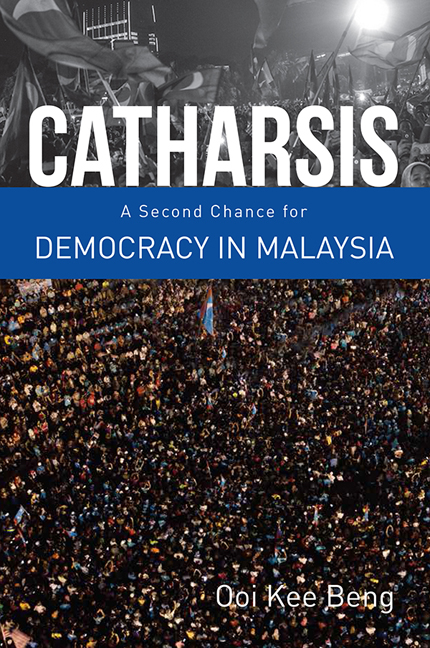Book contents
- Frontmatter
- Contents
- Foreword
- 1 Introduction – Malaysia's Future Is Redeemed
- Before Pakatan Harapan
- Before 9 May 2018
- With Mahathir at the Helm
- Beyond 9 May 2018
- 47 The Bewildering Game of Malaysian Politics, the Rot Within the Barisan Nasional
- 48 A Revolution in Malaysia? Not So Fast…
- 49 Mahathir: Renaissance Man
- 50 Malaysia's Reformasi Movement Lives Up To Its Name
- 51 In Lieu of Race and Religion
- 52 It All Seems So Simple Now…
- 53 Catharsis – The Rebirth of Malaysia Finally Begins
- 54 A Malaysian Spring for Intelligentsia?
- 55 The Layers of Historical Significance of GE14
- About the Author
51 - In Lieu of Race and Religion
from Beyond 9 May 2018
Published online by Cambridge University Press: 12 February 2019
- Frontmatter
- Contents
- Foreword
- 1 Introduction – Malaysia's Future Is Redeemed
- Before Pakatan Harapan
- Before 9 May 2018
- With Mahathir at the Helm
- Beyond 9 May 2018
- 47 The Bewildering Game of Malaysian Politics, the Rot Within the Barisan Nasional
- 48 A Revolution in Malaysia? Not So Fast…
- 49 Mahathir: Renaissance Man
- 50 Malaysia's Reformasi Movement Lives Up To Its Name
- 51 In Lieu of Race and Religion
- 52 It All Seems So Simple Now…
- 53 Catharsis – The Rebirth of Malaysia Finally Begins
- 54 A Malaysian Spring for Intelligentsia?
- 55 The Layers of Historical Significance of GE14
- About the Author
Summary
One can easily see how southern Southeast Asia, being largely maritime, ethnically very diverse and historically and geo-economically a collection of trade routes, in dividing itself into zealous and jealous nation-states over the last century, would as a region see prescribe racial and religious sentiments in the creating of stable national, ethnic majorities.
To be sure, the creation of a politically relevant sense of ethnic commonality has almost always depended on a synchronised proselytisation of a common religion. Thus, communal sentiments have more often than not been constructed by means of an emotive complex of religious control and race construction.
This begs the question, how then is peaceful multicultural life even possible? And relatedly, why would a project of ethnic identity even allow itself to be open-ended and contaminated? Let me in a hasty fashion list some points that I think can help the discussion along.
The Contingency of Ethnic Identity Creation
To start with, ethnicities are not as stable units of identity and community as one might think. Indeed, the project of ethnicity creation is in itself a deceptive undertaking. I would claim it to be a political game played in the interest of a select group more than it is a description of unchanging reality. In Karl Marx's exaggeration, it is necessarily a false identity.
But what comes first? The need to survive or the need to identify? Now, I can agree that since a group is stronger than an individual, group identification immediately increases the chances of survival enormously. Beyond a certain level though, the economic gains to be had from inter-ethnic collaboration becomes obvious. Close societies seem therefore to be rather unstable. One of the greatest political paradoxes in human history is that empires tend necessarily towards multiculturalism while nation-states move in the opposite direction and exert petty control over the expressions of identity of its citizens.
International Economic Mutualism
What humanity has learned more clearly than ever now is that economic interaction between nations and polities is done because it is mutually beneficial. In fact, the post-World War II, post-colonial, post-Cold War era is a period where economic interaction and the conditions needed to sustain and develop international trade are recognised and pursued as the remedy for international war.
- Type
- Chapter
- Information
- CatharsisA Second Chance for Democracy in Malaysia, pp. 201 - 204Publisher: ISEAS–Yusof Ishak InstitutePrint publication year: 2018



